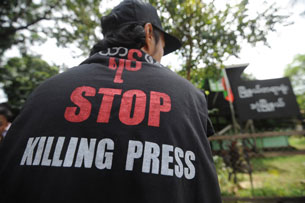A global media watchdog warned Wednesday that authorities in Burma were still imposing “repressive” actions on the media, calling for new laws to ensure that the country will not backslide from landmark press reforms after decades of brutal military rule.
“Officials have not shed their repressive tendencies, as witnessed by the many legal proceedings against privately-owned weeklies in 2012,” the Paris-based Reporters Without Borders (RSF) said in a report.
RSF recommended that the government take steps to “severely punish” anyone found responsible for committing freedom of information violations and to curb lawsuits against the media by ministry officials and civil servants.
Burma should also repeal repressive laws and adopt a media law that respects freedom of information, RSF said.
“The promise of a thorough reform process has not so far been reflected in parliament, which continues to reject proposals for repealing repressive media laws,” the report said.
Burma abolished direct censorship of the media last year and announced last month that it will allow the first private dailies in decades starting in April, in the latest steps toward allowing more freedom of expression.
The government has previously brought lawsuits against media outlets exposing alleged official corruption and suspended the publication of some magazines.
Burma’s journalists face a number of dangers despite an unprecedented set of democratic reforms that have brought about a new era of media freedom in the country, the report said.
RSF, which was only removed from a government travel blacklist in August last year after 25 years, praised Burma’s rapid transition towards democracy spurred by the country’s new quasi-civilian government which took power in 2011 following decades of military rule.
“There has been historic progress for the media and the ground covered by the government has been striking, as evidenced in the recently announced revision of the repressive laws affecting the print media,” it said.
“The release of imprisoned journalists and the end of prior censorship [in August 2012] represent the start of a new era for Burma’s journalists.”
RSF also welcomed Burma’s information ministry’s announcement at the end of December that it would allow the publication of privately-owned dailies this year as “evidence of a commitment to pursue the reforms.”
But the group noted that the promises of change have yet to be realized and said that without firm laws supporting media reforms in place, Burma faces the danger of pulling back from its commitment to new freedoms.
“As things stand, the possibility of the reforms being perverted cannot be ruled out,” RSF said.
Recommendations
It said that while censorship has been lifted, the censorship bureau, known as the Press Scrutiny and Registration Division (PSRD), has still not been disbanded and still wields the power to suspend any weekly that publishes “forbidden” content.
“In the absence of a law providing the media with effective protection, there is a real danger of journalists censoring themselves after decades of government censorship,” RSF said.
It also called on the government to allow all reporters access to state institutions in order to ensure government transparency and to foster media growth in Burma by creating a recognized university course in journalism and ensuring that it is made available in all of the country’s major cities.
RSF said that the media was also responsible for building a supportive environment for journalism in Burma and for continuing to place pressure on the government to reform censorship legislation.
Reporters should fully participate in journalist associations and unions “in order to revitalize the media and defend the media’s interests,” maintain professional ethics and conduct, and resist pressure to censor themselves.
Media outlets should ensure that staff receive training adapted to the new media environment, prioritize coverage of the country’s most isolated regions, and not ignore the situation of the various ethnic groups.
RSF also urged the international community to condition its assistance to the Burmese government on respect for fundamental freedoms, “especially freedom of information.”
It said International nongovernmental organizations should support the development of the Burmese media and the training of journalists, and continue to closely follow developments in media freedom, media legislation and the way ethnic conflicts are handled.
Reported by Joshua Lipes.
Call for ‘Concrete’ Media Reforms
A new report says Burma is in danger of returning to its old ways of media censorship.

A Burmese journalist waits outside a court for a ruling on a defamation case against a media outlet in Rangoon, Aug. 23, 2012.